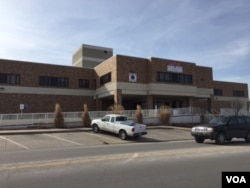Shoes — in miniature and in artwork — line the desk of Dr. Donna Sweet, a Wichita, Kansas, physician known for wearing high heels every day. But she's even better known for her early 1980s work with AIDS patients.
Sweet knows medication keeps HIV patients healthy and helps them avoid transmitting the disease to others.
If the Affordable Care Act's prescription drug coverage is eliminated, "these patients would all be back to the 1983-1984 mode where they die quickly because they don't get their medicines," she said. And without the drugs, she added, HIV patients are much more likely to spread the disease, possibly creating a public health crisis.
Prescription drug and pre-existing health condition coverage are two top provisions of the Affordable Care Act, which was signed into law in March 2010 by then-President Barack Obama. Twenty million Americans have coverage under the ACA, commonly called Obamacare, but detractors complain of recent sharp increases in premiums and lack of provider reimbursements.
The new administration of President Donald Trump has vowed to repeal the act and is researching replacement ideas. Two Republican congressmen announced their ideas Wednesday, but they had difficulty explaining how their proposal would handle pre-existing conditions.
Such coverage is critical to people like Bobby, a Kansan currently looking for work as a designer. He previously ran a store but closed it before the Affordable Care Act was enacted because he couldn't afford employee health insurance. He could reopen the business now but lacks money to invest in it.
Bobby, who did not want his last name or city of residence given, requires expensive medication to stay alive. His daily pill "costs about $2,500 a month," he said as he popped one into his mouth. The Affordable Care Act pays for his prescriptions.
Bobby agreed that the ACA isn't perfect, but his message to Congress is: "Don't do away with it."
Hospital closures
Since passage of the ACA, 80 rural hospitals have closed. Many factors — the recession, shorter inpatient stays, smaller populations — contributed to the shutdowns.
But former hospital administrators and a University of North Carolina study contend that lower reimbursement rates from the ACA and the lack of state mandates to expand Medicaid reimbursements have also been parts of the problem.
Mercy Medical Center in Independence, Kansas, ran into financial trouble and closed in 2015. As a state, Kansas did not increase Medicaid eligibility, making reimbursement a double hardship for the hospital.
Without nearby hospitals, ACA patients must rely on specific clinics, which are difficult to find in rural areas. Cindy Williams has a lack of choice in Iola, Kansas. Her husband lost his job a year ago; she is a paraeducator. They are both covered through the Affordable Care Act.
Williams is anxious about a replacement plan and hopes Congress keeps costs down.
"We've saved money over the years, so we have a little backup," she said. But Williams said the key is Congress. She wants to see bipartisanship on this issue, "because that's when the government works the best."
The plan unveiled Wednesday is expected to be discussed, argued, edited and rewritten several times before Congress votes on whether to approve it.







